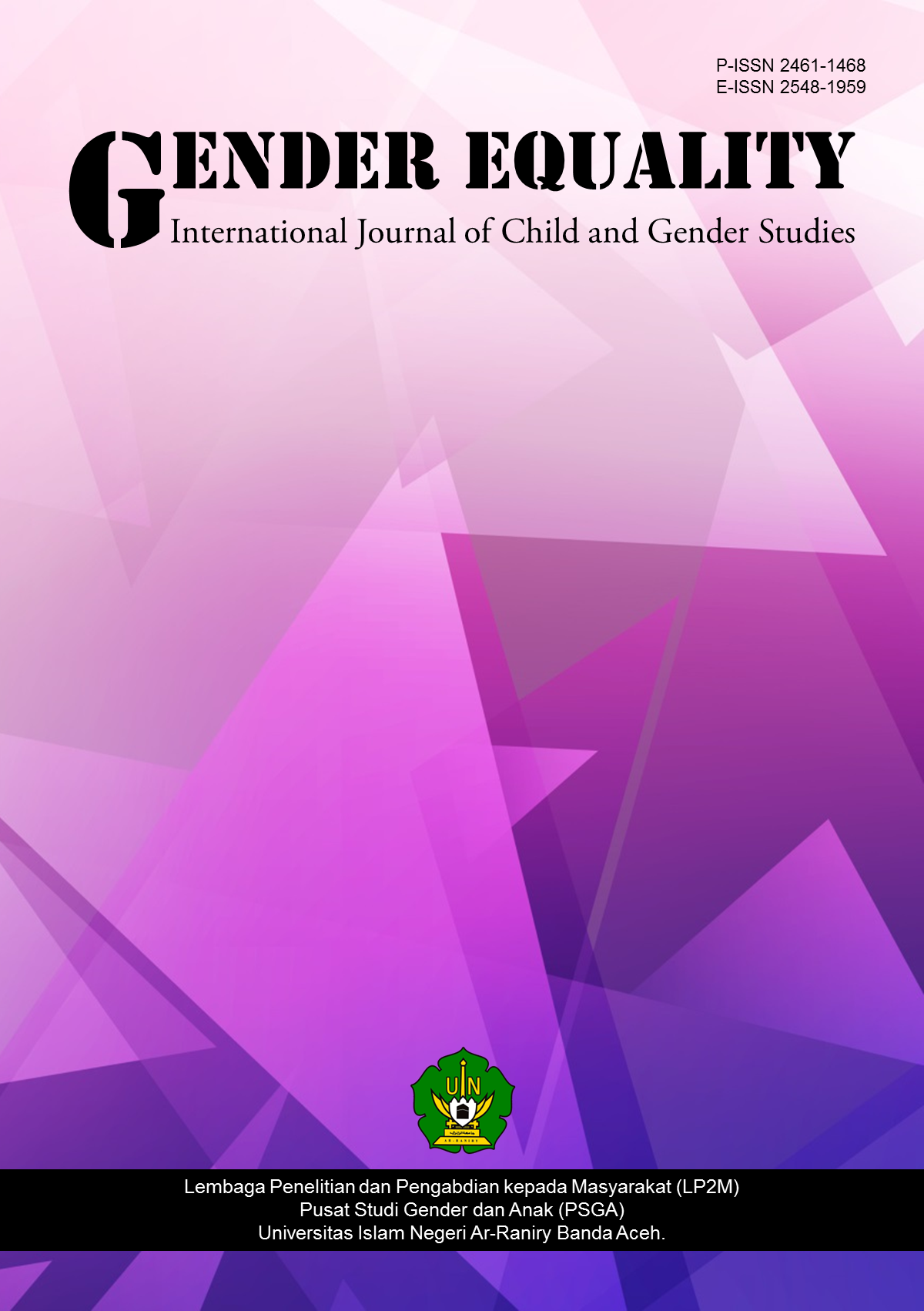PERAN PEREMPUAN DALAM PROSES PEMULIHAN PERDAMAIAN DI BURUNDI MELALUI PENERAPAN RESOLUSI 1325 DEWAN KEAMANAN PBB
DOI:
https://doi.org/10.22373/equality.v3i1.1951Keywords:
Peran perempuan, Burundi, Konflik, Resolusi & Dewan KeamananAbstract
Tulisan ini mencoba menguraikan bagaimana peran perempuan dalam proses pemulihan perdamaian di Burundi melalui penerapan resolusi 1325 Dewan Keamanan PBB. Peran perempuan menjadi objek dalam tulisan ini yang bertujuan untuk mengetahui bagaimana kontribusi perempuan Burundi pada proses pemulihan perdamaian paska perang saudara dengan menggunakan metode deskriptif. Lebih lanjut dapat diuraikan bahwa eksistensi dan kontribusi perempuan Burundi begitu penting pada proses pemulihan paska konflik dengan penerapan resolusi 1325 sesuai dengan amanat Dewan keamanan PBB.References
Ben-Porath, Sigal R.(2006). Citezenship Under Fire. New Jersey : Princeton University Press. Enloe, Cynthia. (1990). Bananas, Beaches, and Bases : Making Feminist Sense of International Politics. London : Pandora Press. Howard, Lise Morje. (2008). UN Peacekeeping in Civil Wars. New York : Cambridge University Press. Jett, Dennis C. (2001). Why Peacekeeping Fails. New York : Palgrave Macmillan. Jenkins, Tony and Betty A. Reardon. (2007). Gender and Peace : Towards a gender – inclusive, holistic perspective, dalam Charles Webel dan Johan Galtung (eds,.), Handbook of Peace and Conflict Studies. New York : Routledge. Peterson, V.Spike & Anne Sisson Runyan. (1993). Global Gender Issues: Dilemmas in World Politics, Oxford : Westview Press. Porter Elizabeth. (2007). Peacebuiding : Women in International Perspective. New York : Routledge. SkjelsbÇ£k, Inger & Dan Smith. (2001).Gender, Peace and Conflict, Oslo : Sage Publication. West, Candace & Don H.Zimmerman. (1991). “Doing Genderâ€, pp.7-13 in Judith Lorber & Susan A.Farrell, eds, The Social Construction of Gender. Newbury Park, CA: Sage. Departement of Peacekeeping Operations. (2004). Gender Resources Package for Peacekeeping Operations. New York : Peacekeeping Best Practices Unit. Departement of Peacekeeping Operations. (2008). United Nations Peacekeeping Operations : Principles and Guidelines. New York : United Nations Secretariat. United Nations. (2005). Gender and United Nations Peacekeeping Operations. New York : Gender Unit, Departement of Peacekeeping Operations. United Nations Development Fund for Women (UNIFEM). (2002) . Women, War and Peace: The Independent Experts‟ Assessment on the Impact of Armed Conflict on Women and Women‟s Role in Peace-building. New York: UNIFEM. Zeitlin, June. (2005). Beijing Betrayed. Women Worldwide Report That Governments have Failed to Turn the Platform into Action. New York: Women‟s Environment and Development Organization. Richard Strickland and Nata Duvvury. (2003). Gender Equity and Peacebuiding : From Rhetoric to Reality: Finding the Way. Washington DC : International Center for Research on Women (ICRW). Prepared for the Gender Equity and Peacebuilding Workshop with a grant from the International Development Research Centre (IDRC), Ottawa, Canada. Nugroho, Tri Ambar “Wanita pada United Nations Peacekeeping Operations: Sebuah solusi dan aset†dalam http:www.pralangga.org.
UN, “ Women in Peacekeepingâ€, dalam http://www.un.org.
Downloads
Published
Issue
Section
License
GENDER EQUALITY: International Journal of Child and Gender Studies allows the author(s) to hold the copyright and to retain the publishing rights without restrictions. Authors who publish with this journal agree to the following terms:
- Authors retain copyright and grant the journal right of first publication with the work simultaneously licensed under a Creative Commons Attribution License that allows others to share the work with an acknowledgment of the work's authorship and initial publication in this journal.
- Authors are able to enter into separate, additional contractual arrangements for the non-exclusive distribution of the journal's published version of the work (e.g., post it to an institutional repository or publish it in a book), with an acknowledgment of its initial publication in this journal.
- Authors are permitted and encouraged to post their work online (e.g., in institutional repositories or on their website) prior to and during the submission process, as it can lead to productive exchanges, as well as earlier and greater citation of published work.



